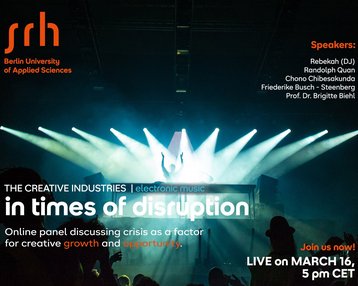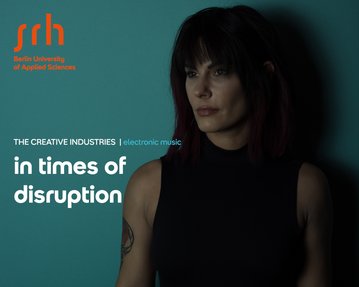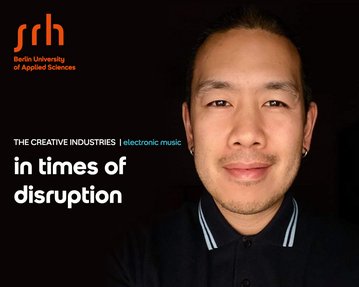Since the pandemic hit, artists worldwide have been struggling with its impact on the creative industries. As clubs were closed and gigs cancelled, we ask ourselves: How are creatives coping? What are the challenges & skills to master the situation?

Creative Industries In Times of Disruption – The Electronic Music Scene
For our first in a series of online panels “Creative Industries in Times of Disruption”, the team from B.A. Creative Industries Management got together to discuss the impact of Covid-19 on the music industry with DJ and techno music producer Rebekah, and photographer and content creator Randolph Quan. With this online panel, the study programme continues its practice-driven research approach, aiming to develop new management strategies in close exchange with industry professionals. The B.A. Creative Industries trains students to support, market and manage success in the creative industries.
We launched our first panel on 16 March at 5pm via Zoom. Our hosts were Student Ambassador Chono Chibesakunda and Friederike Busch-Steenberg joining us from Oslo, where she is currently pursuing her Erasmus semester. Completing the virtual round table is Study Programme Director Prof. Dr. Brigitte Biehl whose current research involves arts and business, along with performances and visuals. Our online audience features registered participants from all over the world, including Portugal, Spain, Nepal, Siberia and Bangladesh.
Rebekah Teasdale aka “Rebekah” has been active in the music industry since the late 1990s. A successful techno DJ and producer, she has played in famous Berlin clubs, including Tresor and Berghain, and has extensively toured Europe and beyond. Our other guest, Randolph Quan, is a photographer, filmmaker and social media content creator. Since the early 2000s, he has worked as a photojournalist for major newspapers in the US, Canada and the UK. While Quan has only been producing music since 2011, his tracks have been included in prominent playlists. Quan also counts German techno artist and DJ Ben Klock among his former clients.
During our talk we touch upon many topics, ranging from social media, authenticity, social activism to general musical practice. Above all, we are keen to find out how our guests are coping during the ongoing crisis.
Drawing from her own history, Rebekah highlights artists’ incredible resilience to tough situations: “As a DJ that’s been in the industry for twenty odd years, I’m used to struggling. I’ve lived without nothing, and I think a lot of the other artists are pretty resilient, too.” However, she continues, the pandemic does pose a new, different kind of challenge that is not limited to financial issues but seems more related to solitude. Sharing that it’s been hard, she further explains how she gains motivation from supporting, developing and mentoring other artists in the industry rather than solely focusing on her own career.
As one who heavily relies on working with artists and being on the road with them, Randolph was strongly shook by the pandemic. Finding support in his group of creative friends, he has come to realise his need to stay creative. In order to keep his mind engaged, he is constantly generating new ideas. His clients are equally active. It seems both parties, artists and managers alike, are keen to keep the ball rolling.
We talked about what it means to work in the music industry. Randolph highlights the need for professionals active in the creative industries to remain flexible, regardless of any ongoing crises. He mentions his own desire to reinvent himself every ten years: “Don’t’ get too comfortable it’s not an industry where you can be around for 30-40 years and do the same thing over and over again”. Rebekah agrees and elaborates on her worries regarding her profession as the stresses of DJing can take a physical toll on anyone. As a possible long-term goal, she can see herself moving into the field of coaching.
Is further education the solution here? It can be. Rebekah, who attended college in 2008 to learn more about music production speaks of this decision as “the best thing she could have done”. Along with a good foundation and a constant creative crowd surrounding her, it gave her a lot of confidence to work as a professional within the industry. When engaging with clients, Randolph in turn applies his studies of media and communication and subsequent training as a photojournalist. When acting as a manager, he refrains from adapting a controlling approach. Rather, he will encourage artists’ creative performances, presenting his ideas to clients as he would when pitching to a newspaper. This is also how Randolph operated when working with DJ Ben Klock. His tip to all creatives regardless of whether they have a manager or not is to keep going, to not take ‘no’ for an answer: “It only takes one person to say ‘yes’ out of the thousands of ‘no´s’ you’ll encounter. Somewhere there’s someone that likes your work and you just have to find that person.”
While numerous DJ producers are currently offering online courses and master classes on mixing and producing tracks, Rebekah prefers to set her focus on fostering creativity. She successfully developed her virtual 10x10 challenge, encouraging musicians to create ten tracks in ten days, calling it a very rewarding experience. Having worked 14 hours a day with a whopping 150 producers, she plans to repeat the challenge at the end of 2021. She has also recently hosted rave sessions via Zoom from her living room. In comparison to streaming, a practice she has been actively pursuing over the last year but perceives as rather sterile, Zoom allows her to interact with the audience and connect with the people behind the camera, offering an overall “overwhelming” experience. She supports the idea of giving back to the community, to keep the scene going so artists will have something to return to after the pandemic. Most notably, in September last year, Rebekah took to Instagram to launch her campaign against sexual harassment and assault #ForTheMusic. Addressing the issues women and members of the LGBQT++ face in the music industry, she used her voice to speak out against issues of sexism.
As the panel comes to an end, we have learned from participants how they were able to use the resources they developed through life experiences as well as education and further training to master the current situation. We also learned that artists are continually re-inventing themselves and the pandemic serves as an opportunity to do just that.
Concluding, it seems, if there is a positive outcome of the pandemic, we can identify it as self-reflection in favour of selflessness. Rather than focusing solely on ourselves, we look outwards. We desire community. We want to stay connected. We want positive change. And most of all, we’ll be here when stage performances and physical events return. And far from business as usual, we’re hoping for a better, kinder and more supportive post-pandemic world.
Text by Jessica Hodgkiss. Images courtesy of the artists.

Study Programme Director B.A. Creative Industries Management

